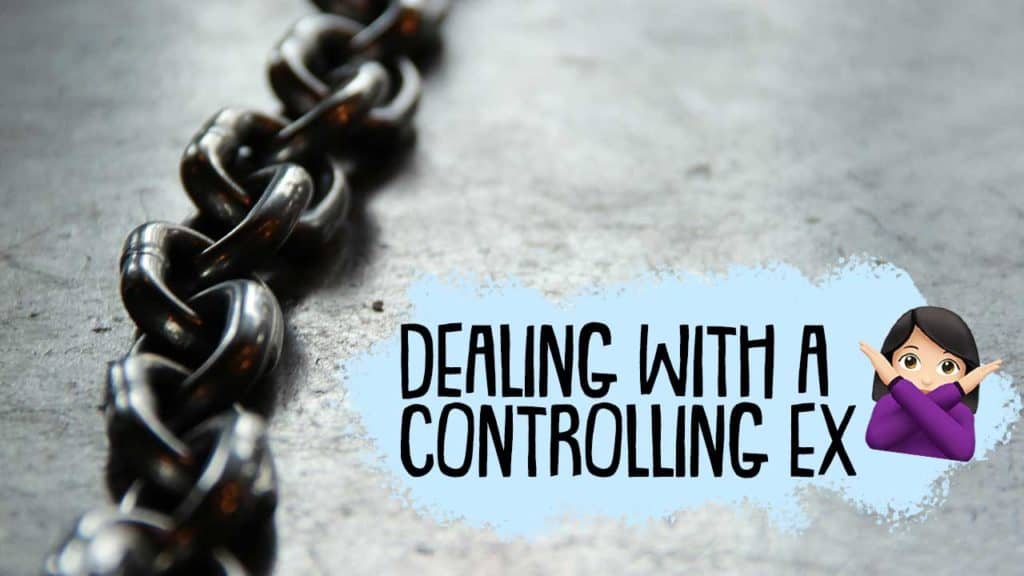Note: For this article, we will be providing strategies on how to deal with toxic exes and those that are controlling and “not so easy.” These strategies are useful for dealing with both your ex or your partner’s ex.
I get it! Your intruding, toxic ex can make you feel like you are spiralling out of control. You may find yourself feeling drained from constant attacks or unnecessary, unpredictable, or inappropriate contact. Just a simple text may send you both wheeling into a frenzy. It can make you feel sick in the stomach and have you screaming at the heavens “what now,” add in a few expletives.
Many couples who were once in a controlling relationship have been on the receiving end of mind-boggling behaviour from their exes. The funny thing here is that their exes would probably say the same. You will learn about why later in the article.
Now, I am going to give you practical ways you can do to:
- support your partner,
- minimize stress and chaos created by your (or your partner’s) vindictive, controlling, interfering, or toxic ex,
- keep yours and your partner’s focus on your relationship,
- maintain your sanity and emotional energy,
- and strengthen your relationship with your partner.
Some exes are just plain nasty, and it would seem they would do anything to be on bad terms with you and your partner. Some struggle with the fact that you have moved on and may act out of jealousy or anger. This jealous ex-wife, husband, girlfriend or boyfriend just feel lost and helpless and are, at this point, incapable of moving on without having to rely on you.
The list could go on. But whatever the reason—do you feel like your ex is knowingly or unknowingly tearing you down, overstepping boundaries, or creating a wedge between you and your partner? Or do they ever give you clear signs that make you think, “my ex probably hates me.”?
If so, then it is time to read on.

How to Support Your Partner Who Has a Controlling Ex
This section is for those of you who are having issues with your partner’s ex and want to know how to best support them.
If this is an issue that you have been dealing with for a long time, emotions can spill over, and frustrations can boil. The turbulence of a situation can make us forget how to best support our partner and take care of ourselves.
Sometimes your insecurities or tendencies to control may also add to or heighten the pressure of a situation. So what do you need to be aware of, and what can you do to best support your partner?
Are you able to leave your partner alone to speak with their ex if they have responsibilities together?
Some of you may offer your partner support when it comes to speaking with, contacting, or dealing with their ex, especially if it is stressful or abusive. But it may be a red flag if you don’t trust your partner to deal with their ex appropriately. That, and if you are not comfortable at all leaving them to respond to texts, have conversations, or have any contact with their ex.
If you trust your partner but cannot leave them alone to sort out their responsibilities without meddling, then you may need to address this. There is a difference between helping or supporting your partner with this situation and interfering or making the situation worse or more stressful.
Support your partner if they ask you. Just a simple, “you’ve got this” and reminder to stay calm can be the foundation they need to have positive communication with their ex and remain strong. Dealing with abuse from their ex and you buzzing around giving off negative vibes can make the situation worse.
It might be a good idea to let your partner contact their ex first, and they can come and debrief you afterwards if they need to. Be their foundation and rock in these situations, instead of standing at the side, adding fuel to the fire.
Your partner is damned if they do, damned if they don’t (by you) when it comes to dealings with their ex. In other words, no matter how they deal with it, you have a negative response to their interactions.
I spoke to a husband who told me precisely about this scenario in dealing with his ex. If he reacted or responded to all of his ex-wife’s texts, his new wife would tell him it was the wrong thing to do. And even if he set boundaries and did not respond at all, his new wife would still tell him it was the wrong thing to do. If he reacted calmly to texts regarding the children’s requirements, his new wife would tell him it was still the wrong thing to do.
Your partner may feel stuck in a situation where they can’t win with their ex; they don’t need two people they can never win with. It may be that you have the habit of arguing, and it is becoming your comfort zone. If this is the case, then you need to address it.
You must allow your partner to succeed and gain your approval. Let them make the decisions that they need. If their choice isn’t great, support them through how they can do it better next time in a way that is not patronizing. Everyone is entitled to make mistakes; your partner is only human, and they will sometimes do things that don’t end with the best results.
- Ask them why they responded that way; their intentions or feelings may surprise you.
- Work out a game plan for response and contact with the ex, and help them find the best ways to stick to this and back them up.
If your partner can’t do anything right by you no matter what they do, your relationship may deteriorate. It sets the tone for a toxic relationship between the two of you.
You take control of the situation without input or permission from your partner.
Your partner’s ex is your partner’s ex, not yours. It is okay and helpful to support them in useful ways. Reduce stress and include them in decision-making.
I spoke with a woman who said her partner would get so consumed by her ex. It reached a point where he would take her phone and start responding to texts and emails without her input. It left her powerless and feeling controlled by both her ex and current partner.
Remember, the responsibilities your partner and their ex have together are separate from your relationship with your partner. Allow them the power to deal with their ex. Grabbing the phone, arguing, or forcing your way into a situation is not going to help. You only become a threat and a nuisance, and another person that your partner feels like they have to navigate—mainly if your actions result in making things worse.
Also, you may feel the need to get involved because you want to help your partner, and you are sick of seeing them treated the way that they are. You feel you can do it better, or you are simply over it. So remind yourself: my partner is an adult and capable of doing this. Ask yourself, ‘Will my actions benefit the situation or make it worse?’
You stir your partner up and add to their emotional unrest.
You may feel justified that you are openly angry or spitballing about your partner’s ex, and in some cases you are. Remember, to support your partner is to help calm a situation, to offer them or refer them to someone who can ease the pressure and balance turbulence. It is okay for emotions and frustrations to boil over sometimes, you’re only human after all. But if you find yourself adding to the tension rather than reducing your partner’s emotional strain, then you are adding to the toxicity rather than disabling it.
Don’t project your anger, frustration, or hurt onto your partner. It can lead to influencing them badly and making them feel worse. They are experiencing enough already. Control how you speak about the situation and focus on solutions, rather than venting solely about the problems. No amount of screaming ‘they just want your money,’ or ‘they are filling your head full of crap’ is going to build a road for a better situation.
Educate yourself about the law and requirements for child support and alimony.
If you are in a relationship with someone who has to pay alimony, child, or spousal support for their ex-partner, it can feel like your relationship financially starts on the back foot. I have had many conversations with people letting me know that their partner’s ex is ‘money-hungry’ or ‘greedy.’ But in many cases, the money or the agreement that your partner adheres to is the law. The law requires them to pay. Educate yourself on the requirements for your particular region. If they owned property together or had children together, it is the law.
Ask to see the agreement or the court documents that are in place for payments. You need to honour them if they are legal documents, or if it is something that your partner has agreed to and is at peace with. You can also use the internet to find out the laws around child support, alimony, and division of property and get up to speed with your partner’s obligations. Even if you don’t feel it is fair or just, it is the law. Getting upset and angry about it won’t change it.
When you educate yourself, you can make space to budget or plan for the future. Planning can help you grow productively together rather than being stuck on things you can’t change or control.
Have you allowed your partner to understand how it is affecting you?
Seriously think about this one. Is your partner fully aware of how this is affecting you and making you feel? Have you had this conversation in a calm, safe, and open manner?
Remember, it may be that your partner was in a havoc- and drama-filled relationship with their ex for quite some time. The challenging behaviour from their ex may be normal for them. They may be used to it, and it may take them some time to understand the effect it is having on you.
So help them to understand by setting a specific time to talk constructively about it. Make rules about the conversation. It is okay to become emotional during this conversation. Once you have spoken about how it is affecting you, it makes space for discussing desired outcomes and action plans.
Do you feel obligated to have contact or be friends with your partner’s ex?
In a perfect world, you and your ex or your partner’s ex would all be friends. This is especially the case if you are in contact, caring for, or contributing to your partner’s children from a previous relationship. In some situations, this is possible. But let’s be real. There are a lot of cases where this is not possible.
It seems that many people think they have to keep communication lines open with their ex or partner’s ex. Some think they have to try and be friends, even when the process comes with endless stress.
“My partner’s ex is outrageously toxic, controlling, overbearing, and has no control in what she says or does. I believe for it to be so unhealthy that I don’t want my own two biological children having contact with her for their own wellbeing. I also don’t want to have contact with her unless it is absolutely necessary for my own wellbeing.
“And I DON’T HAVE TO.
“I no longer respond to messages and will not have conversations about my partner or their children with her. I love my partner’s children as my own, and I treat them as my own, but I can do that without being friends with their biological mum. It would be easier if we could get along, but the behaviours that I have to deal with aren’t worth the energy, and I don’t see them changing any time soon.
“I do not allow anyone to inject negativity into my life, my children’s life, or my relationship, and this includes from my partner’s ex. I am in a relationship with my partner, not his ex. Her aim and communications with me are not for the best interest of her children, but to fill an angry vendetta that she has against my partner. That is between them. I will support him, but I will not engage.” —Anonymous

How to Empower and Support Your Partner With Their Parenting Responsibilities
If your partner has children that preceded you, they have a responsibility, and it will be best to empower and support this. Your partner will have to communicate with their ex. They are parents together. It may feel uncomfortable but remember, this is an important responsibility.
Children are not a tool for interference. Children are important, and if you are a step-parent to your partner’s children from a previous relationship, that is great. But approach this tactfully. Parenting discussions need to be between the parents of the children.
I get that you and your partner will talk about parenting issues and challenges about the children. Sometimes, there will be issues about their ex-partners, or they are co-parenting with a narcissist. This means that your partner’s ex-partner is consumed with anger and vengeance. They manipulate the children and twist reality. And it would really be challenging to get children away from a narcissistic ex. Therefore, you and your partner will discuss what’s the best approach to any problems that arise with the ex concerning the children. But let your partner have the discussions of child-related matters with the other parent as well.
This does a couple of things.
Your Partner Keeps Power
Your partner may get frustrated, angry, or upset with their ex; this is hard to watch. Help them through it, of course. But keep in mind, if they are the person communicating with their ex, they retain their power. I have seen ex-partners try and dilute responsibility and power from their ex and bypassing them and discussing parenting issues with the new partner. This is not healthy in most circumstances.
It Makes a Clear Stand
When your partner is the only one having direct discussions with their ex about the children, it sends a clear message. This is how you converse, and that they have equal parenting responsibility.
How to Minimise Stress and Maintain Your Sanity
Make Expectations and Set Boundaries
“When she couldn’t break past the boundaries that my partner had set, she began messaging me and trying to use me as a platform to bad mouth my husband. When I set boundaries stating that I would not accept that, she actually asked if I could mediate between her and my partner. I felt this was inappropriate and refused to respond to her any further after making my expectations clear.”
For god’s sake, set boundaries with exes. It is not okay for an ex to interfere with your relationship. So just don’t let them.
You may have to block or cut them from certain communications if you need to. In circumstances where the ex does not respect the boundaries or if your ex is violent towards you, your partner, or your children, seek help through police-enforced order.
You need to decide what your expectations are with their behaviour towards you and the boundaries that you are going to set.
Remember to also set boundaries for yourself. Decide on the type of conversations you will not respond to and the behaviour you will accept. If you have certain things that trigger you, then free yourself of them or call a timeout, so you don’t respond poorly. E.g., if your ex starts yelling or being abusive and it makes you crumble. Let them know that if they choose to converse like that, you will end the conversation. Put an end to the conversation if it occurs again.
The following are simple rules for setting boundaries:
- Make your expectations for treatment clear to your ex in written form.
- Do not respond to anything that does not require a response and will only sizzle into an argument.
- Stick to any requirements outlined by legal orders.
- Seek mediation or legal orders if you need to.
Set Ground Rules
This situation is a challenge. With any problem you may face, you can set ground rules or make a plan to help you overcome and best deal with them. I like to call this championing your challenges!
This strategy is about defining your boundaries and setting them so that you can maintain a stable emotional state. It allows you to make the right decisions concerning the situation and does not allow your ex to interfere, have an impact, or define your quality of life.
Create a plan you refer to that can act as a guide to help you respond in ways that are healthy, productive, and useful. For example, you may decide to remove your ex or partner’s ex from your social media accounts. You may decide that it isn’t a good idea that your partner’s ex can freely contact you to discuss their children.
You can use your ground rules to define and set expectations and boundaries for your ex. Warn them that particular behaviour will result in consequences. For example, ‘in the future, if you begin to shout or become abusive, I will hang up the phone and block contact.’ You will then have to communicate via email.
There are two processes to consider when setting ground rules and making a plan.
Unacceptable behaviour | Consequence or Response | Why |
| Ex becomes abusive on the phone | Block contact and only converse through email. | This ensures that I preserve my emotional wellbeing and allows an opportunity for (ex) to consider what they are communicating and how they are communicating. It also gives me a record of our communication. |
Desired Outcome | Action You Will Take | Why |
| Having access to my children without stipulations, bullying, and control. | Employ a mediator. | Communications and arrangements have not been successful. Engaging a third party provides an opportunity for useful communication and planning that is fair and free from emotion. It ensures all decisions are made in the best interests of the children. |
The reason for articulating whys is so you understand the benefits of this process and stay committed to your plan.
You may choose to gain third-party support in creating a plan through a counsellor, mediator, or relationship therapist. Engaging expert advice is a smart move as it allows you to make positive decisions and get a perspective from someone who is not involved in the situation.
The Two Sides Rule: Opposite Perceptions
Now, for the mindset strategists and psychologists out there, sometimes you know too much psychology that you understand ‘why’ people act up, and you excuse them for it.
Some of the behaviour, words, abuse, and attacks thrown at myself and my partner by both of our exes are nothing short of inconceivable. They are sometimes vindictive and driven by anger. This is usually justified with some non-valid reason painted as actions done with the children’s best interests in mind. Like I said earlier, they would probably say the same about us.
Our perceptions of the situation are different. Perceptions can be a key factor in determining someone’s choice of words, feelings, or actions. Maybe you feel like your ex is in the wrong, but they think that you are in the wrong, or you feel like your approach to parenting is better, and they think otherwise. You can see how this can lead to a whirlpool of conflict and disorder.
You need to compromise with, collaborate with, accommodate, and understand each other to be able to resolve issues. However, situations like this can sometimes lead to competition, avoidance, or authoritative non-budging.
Some people feel entirely justified with what they do or say because of their experience or perception, even when it seems nonsensical to you, and vice versa. Remember, your ex may be completely flabbergasted with your actions or behaviours, just as you are with theirs.
We all have different realities.
We construct them the way we need to to make sense of our experience.
Some exes are convinced and will speak to other people as if they are the victim and have put their children’s interests first in all they do. To you, this may seem out of this world, but it is real to them; it is their reality.
Your partner will also have a support group or social herd, as you do. And this will shape what they choose to say, their beliefs, and the actions that they take.
Think about this. How many times have you had a heated phone call with your ex where you feel like their choices and words are outrageous and unfair? What they are saying doesn’t have an inch of truth about it, and you become furious.
Now realize, what they are saying may be true to them. It may be their belief, whether right or wrong. They have created their reality, and you can’t shift it. But you can control yourself by setting boundaries, making an action plan, and utilizing other strategies outlined in this article.
Even if you find yourself screaming at me now, “But they are wrong, they did A, B, C, D…,” understand that ‘your side’ may never be heard or understood by your ex. Many of you are probably caught up in a ‘dog eat dog’ game and stay locked in the past. I know that this can be furiously frustrating. But once you accept that, you can focus on setting boundaries and dealing with the situation.
Control Your Response
You may not be able to control your partner’s ex and how they choose to act, but you are in complete control of your actions and reactions.
It can sometimes feel like a pot of water, throwing steam out the sides and boiling over. With any stressful situation, you can feel like you have had enough and just burst. When you are poked and prodded, you may find that you are on the brink of explosion. When we react out of anger, frustration, dismay—you get the picture—we usually don’t get the outcome we want or make useful choices.
Remember, if you are dealing with a toxic person, they may not be able to see the damage that they are doing. So you need to get a grip.
If you have concluded that your ex is out of control or is overstepping the mark for whatever reason, you may find yourself scratching your head because:
- They are completely unaware of the chaos and stress they are causing.
- They seem to be fueled by or enjoy creating chaos and stress.
This situation is a sticky and tiring one, but you can choose to act or not act to minimize stress and maintain your sanity.
“The supreme art of war is to subdue the enemy without fighting.”
―Sun Tzu, The Art of War
Your ex can’t fight with you if you don’t fight back. They can fight at you, but not with you. There is a big difference. Sometimes silence is the most powerful response. When you are calm and in control of yourself, you can make the right decisions about your responses, reactions, or actions.
There is a lot to be said about a calm mind. Learn strategies if you need to. This is an excellent opportunity for you and your partner for self-development or to work on your emotional intelligence.
“Accept the fact you cannot control your ex. She may (albeit unfortunate, immature, and unfair to the children) choose to continue to act in a dramatic manner, but know that you do not have to respond in a dramatic way, nor do you have to participate.”
The following are the steps to controlling your response and actions:
- Breathe and do not respond or react immediately. No rule book states that any outlandish behaviour has to be returned.
- Remove yourself from the situation if you need time to calm down or assess everything.
- Think about the outcome you want.
- Decide on the action you need to take to get that outcome.
Find a Vomit Pit
A vomit pit is a safe place you can spew all of your anger, hate, dismay, and irritation, where a useful person will listen to you.
You need to talk sometimes, to verbal diarrhea all of your thoughts. If your ex is persistent or toxic, and especially if they cannot see or control what they are doing, it is okay to get it off of your chest.
Your partner is probably well aware of how awful your ex or their ex is and how outlandish their behaviours are. However, they might also need a break from these conversations. They may get defensive and upset for you. They are probably exhausted and stressed from dealing with them and talking about them all the time. Find someone who is not your partner to be your ex vomit pit.
Ensure that the person is a useful vomit pit. By this, I mean, someone who gives you good strategies to deal with the situation or helps you to move on from the negative emotions you feel. Some friends will get worked up with you and keep you angry. This is not useful.
Rules for your ‘vomit pit:’
- It is perfectly acceptable, and you may need to seek a professional to be your vomit pit.
- Avoid people or groups, such as social media groups, that allow you to be a victim and only help you stay angry or sad.
- Do not use your vomit pit to rally troops or get your ex’s friends or mutual friends on your side.
Do Not Stew
You may find yourself stewing or dwelling on conversations, arguments, or situations. This is called rumination and is not beneficial to your health or finding productive outcomes. It is a complete waste of time, but it can be a hard habit to break.
It leaves you feeling lethargic, angry, hurt, sad. Your rumination brings that back every time you go back to thinking about it. Just writing that made me tired!
Many of the strategies suggested in this article will help you to stop this unhelpful cycle, but you may also try the following:
Journaling
Get your thoughts and feelings out of your head and onto paper. Your brain has a nifty little habit of swirling thoughts around uncontrollably, and you feel overwhelmed. Writing them down will not only help you feel better, but it is also constructive. It helps you to capture your thoughts and feelings so you can plan your actions.
Strategy over Stress
You may find that you are constantly going over a thought or problem regarding your ex without completion or a plan. You may also find that much of your dwelling is to your feelings, rather than how you feel. It is much more productive to DDD:
- Define the problem
- Divide your feelings from the actual problem
- Decide on the outcome that you want and the action you are going to take (if any)
Set Boundaries With Mutual Friends
You and your ex may have mutual friends, and that is fine. Set boundaries if you need to. Time with friends shouldn’t be about listening to negative information or talking about your ex or your partner’s ex. Shut down any conversations about them immediately and set expectations about not having such discussions.
I was informed that mutual friends and connections were delivering information to my ex after I removed him from my Facebook. Some of the details were also misleading, which heightened conflict. So, I removed these people from my social media and ceased contact with them. I needed to protect myself and my children from stress.
I had a very interesting phone call from one of my partner’s friends (I seriously felt like I was in high school again). He told me that my partner had never found a girlfriend “strong enough” to deal with his ex. He then told me that “when she starts any conflict, stand by (my partner’s side) and stand up for him.” When I asked why, he said, “because that is what she does.”
Not on my watch. I am an adult. Hence, I can shut down any conflict that I do not welcome into my life. I also said that I wasn’t going to be playing any of these games, and I would make informed opinions. So I thanked him for his concern, but “we didn’t need to discuss this again.”
Toxic habits and cycles of behaviour shut down with clear expectations and boundary setting.
- Make expectations clear to mutual friends
- Only discuss private and emotionally driven information with trusted people.
- Set boundaries where needed (e.g., set your Facebook information on private).
How to Focus On and Strengthen Your Relationship With Your Partner
Date Nights
I cannot stress this enough, make room for date night, or afternoon, or morning, or weekend, or whatever you can fit in.
Date nights are essential to keeping a strong connection with your partner and allowing you time to focus on your relationship.
If you feel like an ex is consuming your time and energy, then your particular rule for date night is only to focus on you and your partner. You need a break, and I guarantee your partner does too.
Having a controlling ex is a stress, and date night allows you an opportunity to free yourself from that. Date nights are proven to make you happier, healthier, and can save your relationship.
If you are looking for reasons why date night is essential or for date night ideas, be sure to check out our article Date Night 101.
Don’t Let It Become a Major Topic of Conversation
Every couple has stressors, but successful couples work through their outside stressors and don’t become engulfed by them. You may feel like the stress caused by your ex is taking over your relationship.
Some couples become immersed in conversations about money, some with work colleagues or friends that are treating them poorly. They become almost obsessed with continuously discussing such topics because they aren’t taking any action to alleviate the pressure. Make sure you don’t get in the spiral trap by doing this about your ex.
If you are talking about it all the time, you may not even have noticed it. It may have become an unhealthy habit. All you need to do is see a message or think of that person to trigger the same negative and worrying conversations.
Imagine a spiral, a whirlpool sucking you down into a vile barrage of spitting lava. This is where you will be pulled down if you don’t pull up quickly. Your conversations and connection as a couple should not be primarily focused on another person or any outside stressor. Relationships are about growth and evolving, not being sucked down into a toxic pit.
My partner and I committed to registered psychologist Dr Patrick Klennan’s Stress-Reducing Conversation every day. It only takes 10–20 minutes, which helped keep conversations about our exes to a minimum. It allowed us to destress without letting it hijack our relationship.
Spend time talking about other things like your goals and achievements together.
Keep the Two Relationships Separate
Your current relationship and your responsibilities that you have with your ex are TWO COMPLETELY different relationships. Remember this. It is UNHEALTHY to allow the stresses from your parenting relationship or obligations from a past relationship to creep in and hinder your own relationship. You need to be mindful and implement strategies to KEEP THE TWO detached emotionally.
A way that you can do this is to practice emotional intelligence and control. Actually get yourself into a state of mind by saying out loud, “This is an issue that needs to be discussed and dealt with; it can not affect and is not a part of your relationship together,” before talking about issues or stressors that are related to an ex.
Remain a Team
You are not always going to get along with your partner. You are not always going to have the same ideas and beliefs in the best ways of dealing with your exes. But you can still remain a team throughout this ordeal.
Define the outcomes that you want, implement some game rules or boundaries. Work out the kind of treatment that is acceptable and unacceptable from your ex and create an action plan to best deal with the situation will definitely help.
Successful couples treat challenging situations as opportunities to be better together. This situation can be an opportunity to learn and grow with each other.
Be positive about each other. During times of stress, it is essential to point out the good things in your relationship and what you like about each other. Toxicity can be a magnet for negative actions between the two of you. Take time out of your day to tell your partner why you appreciate them, what you love about them, what they did well. Ask and explain what you need from each other.
Be Rocks for the Children
Let’s be straight down the line here. Whatever is happening between you, your partner, and your husband or wife’s previous partners IS NOT THE CHILD’S RESPONSIBILITY. It can be detrimental to their sense of belonging, safety, and ability to develop self-worth and esteem if anyone talks badly about another person in this scenario.
If there are kids involved, it is the responsibility of the adults to act accordingly. Unfortunately, some people choose not to do so.
I get it. The other party may be denigrating you or your partner, and it sucks. It really, really sucks. But you need not do the same. You must display some control. Avoid letting your emotions erupt or spill out in front of the children. It is their mother or father, after all.
This will help you develop a solid relationship with your children. You will become a figure of trust and support, a duo with your partner that the children can come to when they feel that they need it.
You need to model healthy behaviour and separate the “marital from the parenting issues.”
If your ex uses the children as a crux for information, leave the information between you and your partner. It is not fair for children to be asked to hold secrets from their parents. They love both, and they want both to be happy. If one is demanding information, they may feel like they are betraying them if they do not hand over what is asked.
Kids have a right to be free from as much emotional baggage as possible. It is not their job to carry emotional baggage that belongs to adults, so don’t hand it to them. Be smart, be aware. Think first.
Let kids detail their feelings to you about the other parent or both of you in a way that is safe and carries no consequence. You need to develop a trusting relationship with them in which they know that you won’t take anything personally, and nothing they say will be used against them. They also need to be sure that you will not speak badly about their other parent to them as this hurts their feelings and breaks the relationship.
My partner’s children would ask me to come and have a chat away from everyone as they knew that they had a safe and non-judgmental ear, and they would be listened to. Additionally, we would also have family ‘meetings,’ and the kids would draw or talk about (age appropriateness):
- Their Feelings
- Their Concerns
- What they wanted from us
Doing such things help create a positive family environment for me, my partner, and especially the children.
Their Past is Not Your Present
Your relationship is between your partner and yourself. It doesn’t matter what your partner experienced in the past with another person; this does not play any part or provide any weight to how well or badly they will treat you. It is not an indicator of the strength of your relationship.
Of course, there are exceptions to this rule. Some people put together in a relationship can be a recipe for fire and fury. This may be the case for you and your ex or your partner and their ex. It does not necessarily mean that the outcome will be the same for you and your current partner.
Also remember, there are two sides, two realities to every story. If you or your partner are starting to listen to the bad things that your exes have to say about you, this is an indication of holes in your relationship with your partner. It is up to you two to work them out.
Do not use their past behaviour or the information you are receiving from your partner’s ex as ammunition or reason to doubt.
Seek Professional Support
There may be a number of reasons to do this.
For Your Mental Health
Dealing with a controlling ex-husband or wife can be exhausting and draining. It may cause you to feel down or unhappy. Seeking therapy or counselling can help to guide you, give you coping strategies, and support your self-care.
The Health of Your Children
Many new couples seek advice to best help their children through the transition of separation to a new relationship. Most of them want to protect their children from parental estrangement even after the divorce or separation. Once again, this is a smart option because you can make sure you are getting support and making decisions that will benefit any children involved.
To Support Your Relationship
Relationships take work. They are about growth and learning. You have to continue to put the effort in to manage them well and make for a happy union. Seeking support and help with your relationship is a good idea. Many happy marriages have a mentor or therapist to help build a foundation, connection, and offer strategies. Adding the stress of a controlling ex, you may need a bit of extra support to stay connected and seek guidance for this situation.
Strategies Guidance
You may like to see a professional to give you concrete strategies or guidance in dealing appropriately and constructively with your ex. I have utilized councillors, police, and domestic violence hotlines to guide me on what to do next, my rights, and how to best manage particular situations.
Mediation
If things are feeling like they are getting out of control, you don’t seem to move forward on issues together, or things seem too tiring, you can always engage with a mediator. A mediator is a third external body that helps add objectivity and acts between you to resolve disputes. It means you don’t have to deal directly with your ex. Moreover, it is also an excellent resource for getting the best outcomes with things like property and children. A mediator will steer away from emotionally fueled decisions based on the best interests of your children or what is fair. They also help keep you safe by setting boundaries and disallowing inappropriate communication between you and your ex.
So there you have it. I really hope that you can take at least one thing that helps you and all involved in this situation. When the ex-wife is controlling or a jealous ex-husband is getting in the way of you and your partner’s relationship, I hope you will learn to deal with them. I have written this based on my own experience. Feel free to pick and choose what you believe will benefit you, and be sure only to use it for good.
I found self-growth, and being reflective and self-aware about how I may have been contributing to the conflict was very powerful in changing the course of these situations.
I also had to make a solid and dedicated commitment to easing the situation and deciding to remove myself from any drama.
Remember, you can’t control others, but you do have the power to control you.






Abby, thank you. I am definately working on my emotional intelligence using your article. I have been struggling 10 years with depression, suffered 33 years inmarriage bcoz my husband is still married to his ex and my stepdaughter. He beats me if i say anything. He turns everything n blame me for everything n still side his 35 year old daughter on everything. I cant get a divorce from him n my 4th child is 8 years old, he controls everything n is trying so hard i wouldnt stand on my 2 feet. I know what to do, i am definately finishing my phd ( he pretend to support, but its a lie),. Hes a piece of shit n i lost myself citing my 4 children as my excuse. I will fly!. Thank you Abbey.
Admiring the time and effort you put into your website and detailed information you present. It’s good to come across a blog every once in a while that isn’t the same out of date rehashed information. Excellent read! I’ve bookmarked your site and I’m including your RSS feeds to my Google account.